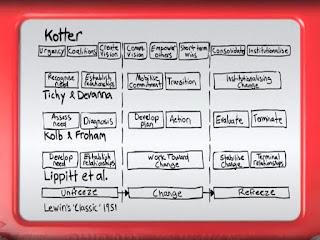Organisational change and innovation has been widely acknowledged to not necessarily be straight-forward; nor is it necessarily good. A lot of change research suggests that "An enduring finding in the change management research is that most organizations do not manage change well" (Lips-Wiersma & Hall, 2007, p. 774).
As is shown in the image accompanying this post, there are a lot of change models: but interestingly many of them appear to look back to Lewin's three stage - freeze, unfreeze, and refreeze - model. The presenter in the YouTube video following makes an argument that Lewin's work has been misrepresented, despite constantly working through the 'Freeze, unfreeze, and refreeze model of change' (SAGE Publishing, 2016). Watch the video for more insight.
Further, the authors provide some advice, in that “When studying change the unit of analysis must be the group, not the individual (as psychology might direct us), the organisation (as modern management studies is want to think) or wider society (as may be the want of the sociologist)" (Cummings et al., 2016, p. 51). Lewin's model contains two key elements: promoting change and promoting constancy. If the group is communicated with and involved (rather than individuals), change processes are more effective. Measuring change is more likely to effective when (a) all stakeholders are involved, and (b) when they work-shop specific processes and alternatives BEFORE agreeing on "the way forward" (Cummings et al., 2016, p. 51).
Sam
References:
Cummings, S., Bridgman, T. and Brown, K. G. (2016). Unfreezing change as three steps: Rethinking Kurt Lewin’s legacy for change management. Human Relations, 69(1), 33-60. https://doi.org/10.1177/0018726715577707
de Jager, P. (2001). Resistance to change: a new view of an old problem. The Futurist, 35(3), 24-27.
Lips-Wiersma, M., & Hall, D. T. (2007). Organizational career development is not dead: a case study on managing the new career during organizational change. Journal of Organizational Behavior, 28(6), 771–792. https://doi.org/10.1002/job.446
SAGE Publishing. (11 March 2016). Unfreezing change as three steps [video]. YouTube. https://youtu.be/iJfdmT1UtBY


No comments :
Post a Comment
Thanks for your feedback. The elves will post it shortly.